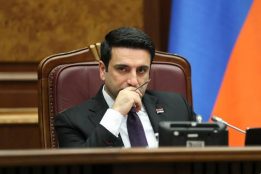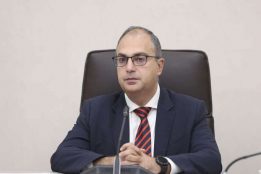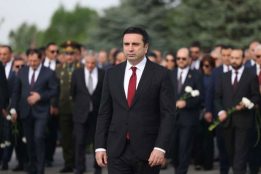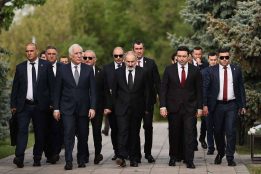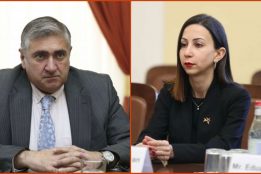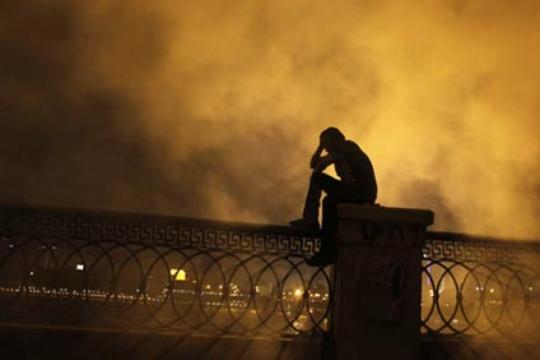
Robert Danin from Council on Foreign Affairs outlined the key developments of the Arab world in 2012. Find the article below.
Here it is: the second annual Middle East Matters year-end roundup listing the ten most significant Middle East developments of 2012. Since this blog focuses on the interplay between U.S. policy and the region, the items selected were those deemed most noteworthy from an admittedly American foreign policy perspective. This was a tumultuous year in the region, and many items on this list could have been deemed the single most significant. So in roughly chronological order are MEM’s top ten for 2012:
1. The Cold War with Iran Heats Up
International tensions with Iran over its nuclear program escalated dramatically in 2012. At several points, it seemed that military action against Iran’s nuclear facilities was imminent, if not inevitable. The year began with President Obama signing into law “crippling sanctions” on Iran, and the European Union agreeing to impose an unusually strong oil embargo. Iran threatened to close the Strait of Hormuz, a refrain it would maintain throughout the year. The United States built up its naval forces in the Strait in July, as Israel increasingly warned that Iran was about to enter a “zone of immunity”—a term coined by Defense Minister Ehud Barak to signify a moment when Iran’s program would no longer be vulnerable to Israeli military action.
As the summer heated up, so too did the regional sense that an Israeli strike might be impending. U.S. and Israeli national security officials, who sustained a seemingly unprecedented pace of high-level consultations throughout the year over Iran, seemed to differ less over analysis than on policy. As tensions mounted into September, President Obama issued his strongest statements to date before the United Nations General Assembly, declaring, “the United States will do what we must to prevent Iran from obtaining a nuclear weapon.” Days later, Israeli prime minister Netanyahu told the same international body that Iran must be prevented from concluding its second stage of enrichment necessary to make a bomb, which he said would be finished by next spring or summer. Israel, in effect, seemed to give key international negotiators until spring 2013 to force Iran to back down before the question of Israeli military action would have to be definitively contemplated. International efforts to bring about a halt to Iran’s nuclear program, one way or another, will likely crescendo, perhaps conclusively, in the year ahead.
2. Muslim Brotherhood Elected in Egypt
The previously-banned Muslim Brotherhood was voted into power this year in Egypt’s first free and fair elections. In January, the Muslim Brotherhood mobilized its supporters and won 47 percent of the parliament’s seats. In April, as Egypt prepared for its presidential elections, the Supreme Presidential Electoral Commission disqualified ten candidates from running for president, including the Muslim Brotherhood’s chief strategist Khairat el-Shater. Instead, the Muslim Brotherhood nominated the relatively unknown Mohammed Morsi, mocked in Egypt as the Brotherhood’s “spare tire.” Nonetheless, Morsi was able to exploit the Muslim Brotherhood’s strong grassroots network and highly organized team, emerging victorious in June by beating former Mubarak prime minister Ahmed Shafiq in a run-off election. Morsi was sworn-in to office as Egypt’s fifth president on June 30, becoming Egypt’s first civilian president and the first democratically elected Islamist Arab head of state.
3. Syria Descends into Civil War
Syria’s already violent uprising became a full-fledged civil war in 2012. Fighting in the conflict that had first erupted in March 2011 had been limited to certain parts of the country, away from the largest population centers. In July 2012, however, full-fledged fighting erupted in Syria’s two largest cities: Damascus and Aleppo. The opposition inflicted a major blow on the regime with its July 18 bombing of the National Security headquarters in downtown Damascus, killing four of the regime’s senior-most officials, including Defense Minister Rajiha, Assad’s brother-in-law and Deputy Defense Minister Assef Shawkat, Security Bureau head Hisham Ikhtiar, and Hassan Turkmani. While the regime immediately unleashed efforts to establish control, it has still failed. Just this week, Vice President Farouk al-Shara conceded that victory was not at hand for the regime. Whereas at the beginning of the year some five thousand Syrians had died, according to U.N. officials, that estimate is now seven to tenfold greater with the number of Syrians killed nearing fifty thousand.
Syria’s civil war has had a significant spillover effect on its neighbors. The UNHCR estimates that more than half a million Syrian refugees have registered, or are awaiting registration, in nearby countries, with the number growing by three thousand daily. Violence from the war has spilled across Syria’s borders, with clashes occurring between Syrian and Jordanian forces, mortar and artillery exchanged between Syria and Turkey, and with mortar fire into the Israeli-occupied Golan triggering the first IDF firing into Syria since the 1973 war.
4. The Innocence of Muslims Anti-American Riots
A movie trailer defaming the Muslim prophet Mohammad, posted on YouTube, precipitated a string of violent and deadly anti-American protests that began on September 11 with the storming of the U.S. embassy in Egypt. The demonstrations quickly spread throughout much of the Muslim world. The Arabic-dubbed version of the fourteen minute-long movie trailer titled The Innocence of Muslims inspired demonstrators to breach the U.S. embassy compound in Cairo and burn the post’s American flag. Hundreds of protesters armed with rocks and Molotov cocktails clashed in Tahrir Square the following days, as demonstrations quickly spread across the region to Yemen, Lebanon, Tunisia, Morocco, Gaza, Tel Aviv, Iran, Iraq, and Sudan. Demonstrators stormed U.S. embassies in Yemen, Tunisia, and Sudan, while the American school in Tunis was looted and burned. President Obama telephoned Egyptian president Morsi and urged him to call off government-inspired demonstrations. Obama publicly labeled the film “crude and disgusting,” but noted that the United States could not ban the video because the Constitution protects the right to practice free speech, a message many Middle Easterners found hard to believe.
5. U.S. Ambassador Killed in Benghazi
Terrorists attacked the U.S. Benghazi consulate on September 11, killing ambassador Christopher Stevens, State Department official Sean Smith, and CIA contractors Glen Doherty and Tyrone Woods. Chris Stevens was the first American ambassador killed in the line of duty since 1988. Initially erroneously reported as a spontaneous protest over the anti-Muslim film, the Innocence of Muslims, the attack was later confirmed to have been a planned assault by Islamist militants. To this date the perpetrators remain unknown, though the Libyan Islamist militia Ansar al-Shariah is suspected of having been involved and possibly having led the attack. U.S. intelligence officials are still investigating the possibility of ties between Ansar al-Sharia, which espouses jihadi theology, and other suspected involved militants to Al Qaeda in the Islamic Maghreb.
The Benghazi attack took place against a backdrop of instability and violence that has spread throughout Libya in the wake of last year’s uprising that overthrew Muammar Qaddafi. Libya’s General National Congress recently designated seven southern military areas restricted zones with the aim to improve security and stem the flow of weapons, militants, and narcotics that currently flow freely across Libya’s borders. Today, the country’s weak security forces still exert little authority at best, particularly in the south, which has witnessed a dramatic increase in violent tribal conflict. Events in Libya demonstrate the challenge of establishing fully functioning, if not democratic, institutions in countries where dictators had centralized all power and authority in the figure of one person. The events of this year’s 9/11 in Libya continue to reverberate throughout American politics today.
6. Unrest in Jordan
Mid-November demonstrations in Jordan that left at least one demonstrator dead, precipitated by the lifting of fuel subsidies, led to some instant predictions of an Egypt or Tunisia-like uprising in the Hashemite kingdom. With some demonstrators calling for the end of King Abdullah’s rule, a clear and ominous red-line in Jordan’s political discourse was indeed crossed. Demonstrations are, however, part of Jordan’s political culture, and the country clearly faces severe economic and political challenges. At least two hundred thousand Syrians have taken refuge in Jordan, energy expenditures account for over 30 percent of the government’s budget, and overseas assistance has declined, while the country faces the same youth bulge sweeping the rest of the region. What has Jordan observers worried is the fusion of economic discontent, anger at perceived government corruption, and the frustration within some of the East Bank tribes. To date, the Hashemites have been able to deflect popular discontent onto the government; King Abdullah sacked four prime ministers in the past year alone.
But Abdullah recognizes that more needs to be done. Jordan will hold new parliamentary elections on January 23 as part of the king’s reform initiative. However, the Islamic Action Front, Jordan’s leading Islamist party, is boycotting the election. The key challenge facing the regime is to ensure that the elections and their aftermath are truly transformative and that Jordanian political institutions are seen as the appropriate fora for addressing political grievances. With Iraq to the east, Syria to the north, Palestine to the west, and Egypt to the south, Jordanians see unrest all around. While a source of inspiration for some, it is a cautionary sign for most Jordanians. Nonetheless, Jordan faces significant challenges and will doubtlessly experience major bumps on the immediate road ahead.
7. Israel-Hamas November Conflict
Hamas-Israel violence erupted into a major military confrontation in mid-November that was quieted after sustained high-level American and Egyptian diplomatic efforts. On November 14, Israel assassinated Hamas’ military mastermind Ahmed Jaabari and other top officials in Gaza following a prolonged period in which hundreds of rockets and mortar were fired into southern Israel. In the ensuing fighting, Israel destroyed much of Hamas’ imported Iranian-produced Farj-5 missiles and other high-value military targets. Undeterred, Hamas sent rockets deep into Israel’s heartland for the first time since Saddam Hussein fired rockets at Israel in 1991. With Israel threatening to send ground troops into Gaza—a move that many feared would test the durability of the Israel-Egypt peace treaty under the new Morsi government—President Obama, traveling in Asia, intervened to help quiet the situation. After at least a half dozen phone calls between Obama and Egypt’s recently elected Islamist president and the dispatch of Secretary of State Clinton to the Middle East, a cease-fire was announced on November 21.
That Clinton curtailed her trip with the president to broker a halt to Israeli-Palestinian violence symbolized the conflict’s ability to suck American diplomacy back into the region despite the administration’s attempts to pivot its focus towards Asia. The conflict also drew post-revolutionary Egypt into a central brokering role between Israel and Hamas at Washington’s behest. In doing so, many asked whether the United States and Egypt were lapsing back into the pre-revolutionary compact whereby Egypt acts to preserve regional stability in exchange for American largesse and a blind eye towards Cairo’s domestic conduct. It also fortified Hamas’ centrality as the address responsible for all groups in Gaza, diminishing the organization’s international isolation. While the Israel-Gaza border has subsequently remained largely quiet, the situation there is extremely fragile and could easily deteriorate quickly once again.
8. The United Nations Recognizes Palestine as Non-Member State
The United Nations General Assembly voted overwhelmingly on November 29 to upgrade Palestine to the status of non-member observer state by a margin of 138 votes in favor, 9 against, and 41 abstentions. The United States and Israel led a vocal minority that included Canada and the Czech Republic, while the United Kingdom and Germany abstained. France led a contingent of EU countries supporting the upgrade. Following the vote, Secretary of State Clinton called the move “unfortunate and counterproductive.” While thwarted in his original effort to win recognition at the Security Council fourteen months earlier, the General Assembly vote marked a symbolic victory for President Abbas and a PLO desperate to demonstrate the benefits of their diplomatic approach in contrast to Hamas’ strategy of “resistance.”
Abbas consistently has maintained that his statehood gambit is compatible with a return to peace negotiations. Israel, however, has interpreted Abbas’ move as a punitive unilateral act of confrontation, not as a move to facilitate talks or future cooperation. The confrontational perception was fortified in the vote’s run-up when the Palestinians reportedly rejected U.S. and Israeli efforts to gain assurances that the Palestinians will not challenge Israel and individual Israelis in international fora, most notably the International Criminal Court. Prime Minister Netanyahu immediately announced measures to accelerate settlement activities in the occupied territories and withhold tax remittances to Abbas’ government. With no apparent prospect of imminent reconciliation or negotiations between Abbas and Netanyahu, and with Hamas appearing to be on the political ascendancy, it remains unclear whether President Obama intends to once again make the Israeli-Palestinian conflict a top administration priority for his second term.
9. International Failure in Syria
The international community failed over the course of 2012 to halt Syria’s ongoing bloodshed, bring about Bashar al-Assad’s departure, or effectuate a meaningful political process for ending the country’s civil war. Twice in 2012, China and Russia exercised their veto in the Security Council—in February against an Arab League-backed resolution calling upon Assad to step down, and then again in July against a proposed resolution imposing economic sanctions on Syria. The dual-hatted UN-Arab League envoy to Syria, Kofi Annan, proposed a 6-point plan in March to end the fighting and initiate a political transition that was endorsed by the United Nations General Assembly. A joint Arab League-UN observer team was dispatched to support the Annan effort, but its movements were constrained and their presence seemed only to intensify the regime’s determination to employ brutal violence to end the civil war. The plan never gained any traction on the ground and Annan announced his resignation in early August. Former Algerian foreign minister Lakhdar Brahimi was appointed in his place later that month, though his efforts have faced the same limitations as Annan’s.
International efforts towards Syria instead centered largely on supporting Syrian opposition groups. The Free Syrian Army reportedly received significant weapons and financial assistance from the Gulf, allowing it to make some dramatic gains inside Syria. Meanwhile, in November, Secretary of State Clinton helped lead an effort to forge an alternative to the deeply divided Syrian National Council. That new group, the Syrian Opposition Coalition, was recognized by Washington as the legitimate representative of the Syrian people in December, and has also been recognized by more than one hundred other countries. Given the failure of international diplomacy to stave off Syria’s civil war, it seems almost certain that the country’s fate will be determined by developments on the ground.
10. Muslim Brotherhood Strives to Consolidate Power in Egypt
On November 22, just one day after garnering international recognition for his role in brokering an Israel-Hamas ceasefire, Egyptian president Mohammed Morsi shocked Egypt by issuing a decree granting himself broad sweeping powers outside judicial review. Morsi used these new self-appointed powers to ensure that the Islamist dominated constituent assembly tasked with writing a new constitution could not be subject to the judiciary’s scrutiny. Morsi tried to market his move as a temporary measure designed to ensure the revolution’s continued progress. Instead, Morsi precipitated immediate accusations of tyranny and dictatorship, spurring secular oppositionists to form the National Salvation Front, led by Mohammed El-Baradei, Hamdeen Sabbahi, and Amre Moussa. Hundreds of thousands of protesters poured into the streets to demonstrate against the president’s decree.
Precipitating further violent protests, the Islamist-dominated constituent assembly submitted a draft constitution that was quickly approved by Morsi, who then put in place a national referendum that is currently on-going. Having put the constitution to a vote, Morsi recently rescinded many elements of his initial decree. Yet he also instructed the military to provide extraordinary security, spurring charges that Egypt was now under martial law. The military’s backing of Morsi and his efforts demonstrated a close working partnership between the Muslim Brotherhood and the armed forces. To date, Morsi has proven to be effective, if not heavy handed, in imposing his will upon the Egyptian people while diminishing popular support for the Muslim Brotherhood along the way. With new parliamentary elections slated for early next year, it is to be seen if Egypt’s challenges will be resolved peacefully through newly revamped institutions, or if rising discontent and seemingly insurmountable challenges will lead to more violence and political action in the country’s streets.

















